Business Management: Law and Economics Assignment Analysis
VerifiedAdded on 2023/01/23
|17
|3546
|36
Homework Assignment
AI Summary
This business management assignment addresses two key areas: business law and economics. The law portion delves into the Human Rights Act (HRA) and its interpretation by the courts, focusing on sections 2, 3, 4, 6, and 19, examining the interaction between the judiciary, the executive, and the legislature. It explores declarations of incompatibility, the role of parliament, and the political considerations influencing compliance with court decisions. The economics section covers elasticity of demand, including unitary, perfectly elastic, and perfectly inelastic scenarios, with calculations. It also analyzes the impact of tariffs on supply and demand, using the example of iPhone 8s, and discusses how changes in substitute product prices and wages affect demand and supply dynamics. The assignment offers a comprehensive analysis of legal and economic principles relevant to business management.
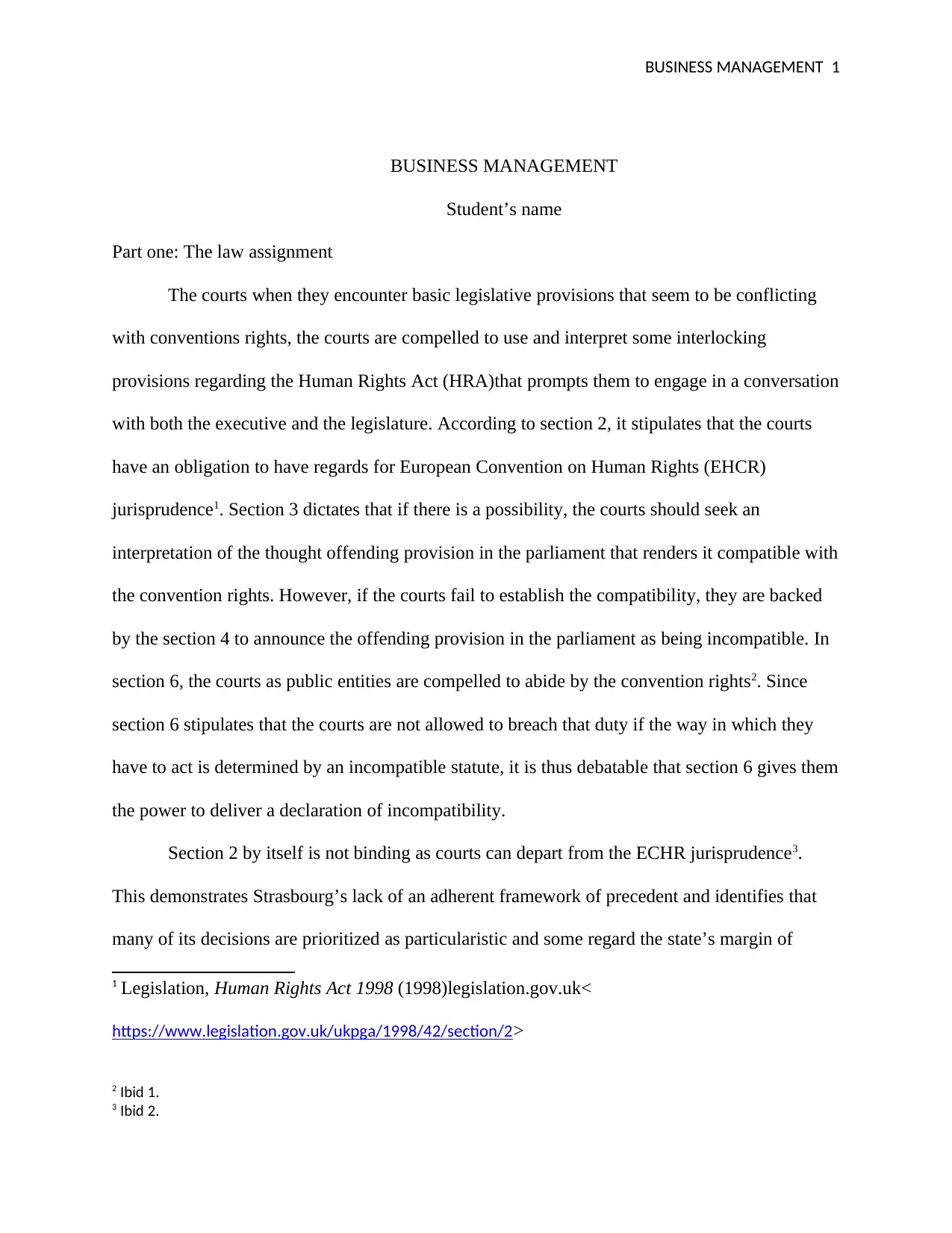
BUSINESS MANAGEMENT 1
BUSINESS MANAGEMENT
Student’s name
Part one: The law assignment
The courts when they encounter basic legislative provisions that seem to be conflicting
with conventions rights, the courts are compelled to use and interpret some interlocking
provisions regarding the Human Rights Act (HRA)that prompts them to engage in a conversation
with both the executive and the legislature. According to section 2, it stipulates that the courts
have an obligation to have regards for European Convention on Human Rights (EHCR)
jurisprudence1. Section 3 dictates that if there is a possibility, the courts should seek an
interpretation of the thought offending provision in the parliament that renders it compatible with
the convention rights. However, if the courts fail to establish the compatibility, they are backed
by the section 4 to announce the offending provision in the parliament as being incompatible. In
section 6, the courts as public entities are compelled to abide by the convention rights2. Since
section 6 stipulates that the courts are not allowed to breach that duty if the way in which they
have to act is determined by an incompatible statute, it is thus debatable that section 6 gives them
the power to deliver a declaration of incompatibility.
Section 2 by itself is not binding as courts can depart from the ECHR jurisprudence3.
This demonstrates Strasbourg’s lack of an adherent framework of precedent and identifies that
many of its decisions are prioritized as particularistic and some regard the state’s margin of
1 Legislation, Human Rights Act 1998 (1998)legislation.gov.uk<
https://www.legislation.gov.uk/ukpga/1998/42/section/2>
2 Ibid 1.
3 Ibid 2.
BUSINESS MANAGEMENT
Student’s name
Part one: The law assignment
The courts when they encounter basic legislative provisions that seem to be conflicting
with conventions rights, the courts are compelled to use and interpret some interlocking
provisions regarding the Human Rights Act (HRA)that prompts them to engage in a conversation
with both the executive and the legislature. According to section 2, it stipulates that the courts
have an obligation to have regards for European Convention on Human Rights (EHCR)
jurisprudence1. Section 3 dictates that if there is a possibility, the courts should seek an
interpretation of the thought offending provision in the parliament that renders it compatible with
the convention rights. However, if the courts fail to establish the compatibility, they are backed
by the section 4 to announce the offending provision in the parliament as being incompatible. In
section 6, the courts as public entities are compelled to abide by the convention rights2. Since
section 6 stipulates that the courts are not allowed to breach that duty if the way in which they
have to act is determined by an incompatible statute, it is thus debatable that section 6 gives them
the power to deliver a declaration of incompatibility.
Section 2 by itself is not binding as courts can depart from the ECHR jurisprudence3.
This demonstrates Strasbourg’s lack of an adherent framework of precedent and identifies that
many of its decisions are prioritized as particularistic and some regard the state’s margin of
1 Legislation, Human Rights Act 1998 (1998)legislation.gov.uk<
https://www.legislation.gov.uk/ukpga/1998/42/section/2>
2 Ibid 1.
3 Ibid 2.
Paraphrase This Document
Need a fresh take? Get an instant paraphrase of this document with our AI Paraphraser
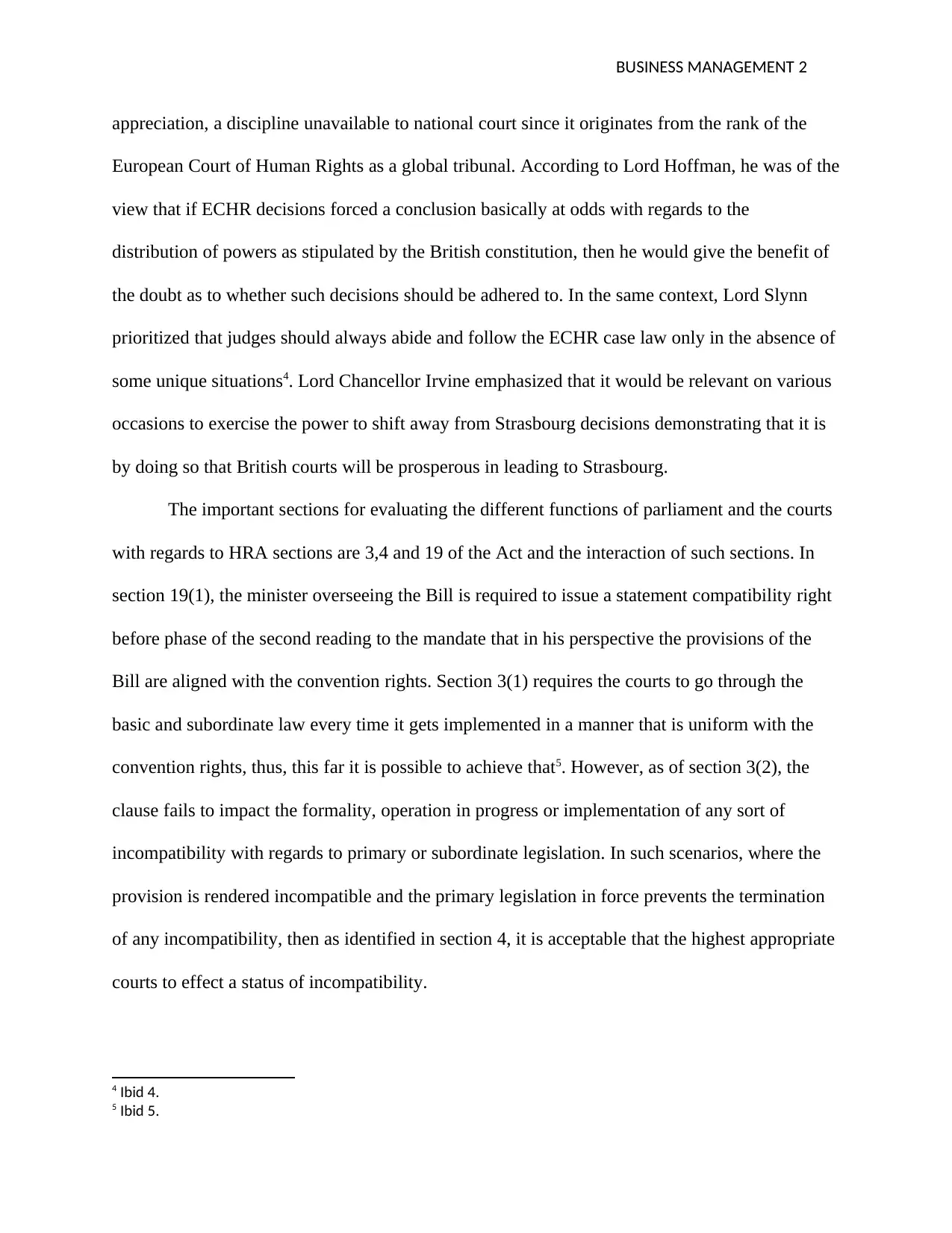
BUSINESS MANAGEMENT 2
appreciation, a discipline unavailable to national court since it originates from the rank of the
European Court of Human Rights as a global tribunal. According to Lord Hoffman, he was of the
view that if ECHR decisions forced a conclusion basically at odds with regards to the
distribution of powers as stipulated by the British constitution, then he would give the benefit of
the doubt as to whether such decisions should be adhered to. In the same context, Lord Slynn
prioritized that judges should always abide and follow the ECHR case law only in the absence of
some unique situations4. Lord Chancellor Irvine emphasized that it would be relevant on various
occasions to exercise the power to shift away from Strasbourg decisions demonstrating that it is
by doing so that British courts will be prosperous in leading to Strasbourg.
The important sections for evaluating the different functions of parliament and the courts
with regards to HRA sections are 3,4 and 19 of the Act and the interaction of such sections. In
section 19(1), the minister overseeing the Bill is required to issue a statement compatibility right
before phase of the second reading to the mandate that in his perspective the provisions of the
Bill are aligned with the convention rights. Section 3(1) requires the courts to go through the
basic and subordinate law every time it gets implemented in a manner that is uniform with the
convention rights, thus, this far it is possible to achieve that5. However, as of section 3(2), the
clause fails to impact the formality, operation in progress or implementation of any sort of
incompatibility with regards to primary or subordinate legislation. In such scenarios, where the
provision is rendered incompatible and the primary legislation in force prevents the termination
of any incompatibility, then as identified in section 4, it is acceptable that the highest appropriate
courts to effect a status of incompatibility.
4 Ibid 4.
5 Ibid 5.
appreciation, a discipline unavailable to national court since it originates from the rank of the
European Court of Human Rights as a global tribunal. According to Lord Hoffman, he was of the
view that if ECHR decisions forced a conclusion basically at odds with regards to the
distribution of powers as stipulated by the British constitution, then he would give the benefit of
the doubt as to whether such decisions should be adhered to. In the same context, Lord Slynn
prioritized that judges should always abide and follow the ECHR case law only in the absence of
some unique situations4. Lord Chancellor Irvine emphasized that it would be relevant on various
occasions to exercise the power to shift away from Strasbourg decisions demonstrating that it is
by doing so that British courts will be prosperous in leading to Strasbourg.
The important sections for evaluating the different functions of parliament and the courts
with regards to HRA sections are 3,4 and 19 of the Act and the interaction of such sections. In
section 19(1), the minister overseeing the Bill is required to issue a statement compatibility right
before phase of the second reading to the mandate that in his perspective the provisions of the
Bill are aligned with the convention rights. Section 3(1) requires the courts to go through the
basic and subordinate law every time it gets implemented in a manner that is uniform with the
convention rights, thus, this far it is possible to achieve that5. However, as of section 3(2), the
clause fails to impact the formality, operation in progress or implementation of any sort of
incompatibility with regards to primary or subordinate legislation. In such scenarios, where the
provision is rendered incompatible and the primary legislation in force prevents the termination
of any incompatibility, then as identified in section 4, it is acceptable that the highest appropriate
courts to effect a status of incompatibility.
4 Ibid 4.
5 Ibid 5.
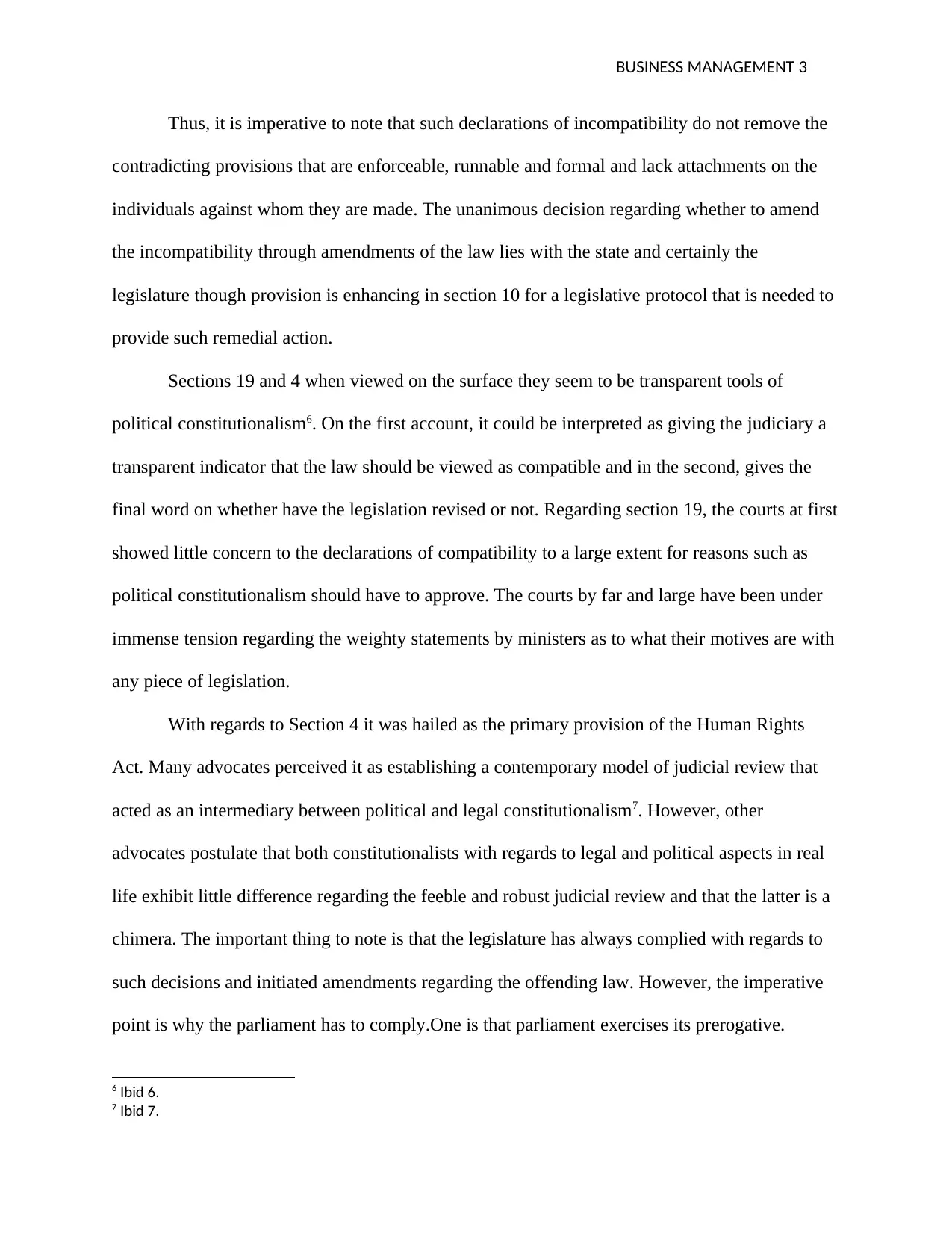
BUSINESS MANAGEMENT 3
Thus, it is imperative to note that such declarations of incompatibility do not remove the
contradicting provisions that are enforceable, runnable and formal and lack attachments on the
individuals against whom they are made. The unanimous decision regarding whether to amend
the incompatibility through amendments of the law lies with the state and certainly the
legislature though provision is enhancing in section 10 for a legislative protocol that is needed to
provide such remedial action.
Sections 19 and 4 when viewed on the surface they seem to be transparent tools of
political constitutionalism6. On the first account, it could be interpreted as giving the judiciary a
transparent indicator that the law should be viewed as compatible and in the second, gives the
final word on whether have the legislation revised or not. Regarding section 19, the courts at first
showed little concern to the declarations of compatibility to a large extent for reasons such as
political constitutionalism should have to approve. The courts by far and large have been under
immense tension regarding the weighty statements by ministers as to what their motives are with
any piece of legislation.
With regards to Section 4 it was hailed as the primary provision of the Human Rights
Act. Many advocates perceived it as establishing a contemporary model of judicial review that
acted as an intermediary between political and legal constitutionalism7. However, other
advocates postulate that both constitutionalists with regards to legal and political aspects in real
life exhibit little difference regarding the feeble and robust judicial review and that the latter is a
chimera. The important thing to note is that the legislature has always complied with regards to
such decisions and initiated amendments regarding the offending law. However, the imperative
point is why the parliament has to comply.One is that parliament exercises its prerogative.
6 Ibid 6.
7 Ibid 7.
Thus, it is imperative to note that such declarations of incompatibility do not remove the
contradicting provisions that are enforceable, runnable and formal and lack attachments on the
individuals against whom they are made. The unanimous decision regarding whether to amend
the incompatibility through amendments of the law lies with the state and certainly the
legislature though provision is enhancing in section 10 for a legislative protocol that is needed to
provide such remedial action.
Sections 19 and 4 when viewed on the surface they seem to be transparent tools of
political constitutionalism6. On the first account, it could be interpreted as giving the judiciary a
transparent indicator that the law should be viewed as compatible and in the second, gives the
final word on whether have the legislation revised or not. Regarding section 19, the courts at first
showed little concern to the declarations of compatibility to a large extent for reasons such as
political constitutionalism should have to approve. The courts by far and large have been under
immense tension regarding the weighty statements by ministers as to what their motives are with
any piece of legislation.
With regards to Section 4 it was hailed as the primary provision of the Human Rights
Act. Many advocates perceived it as establishing a contemporary model of judicial review that
acted as an intermediary between political and legal constitutionalism7. However, other
advocates postulate that both constitutionalists with regards to legal and political aspects in real
life exhibit little difference regarding the feeble and robust judicial review and that the latter is a
chimera. The important thing to note is that the legislature has always complied with regards to
such decisions and initiated amendments regarding the offending law. However, the imperative
point is why the parliament has to comply.One is that parliament exercises its prerogative.
6 Ibid 6.
7 Ibid 7.
⊘ This is a preview!⊘
Do you want full access?
Subscribe today to unlock all pages.

Trusted by 1+ million students worldwide
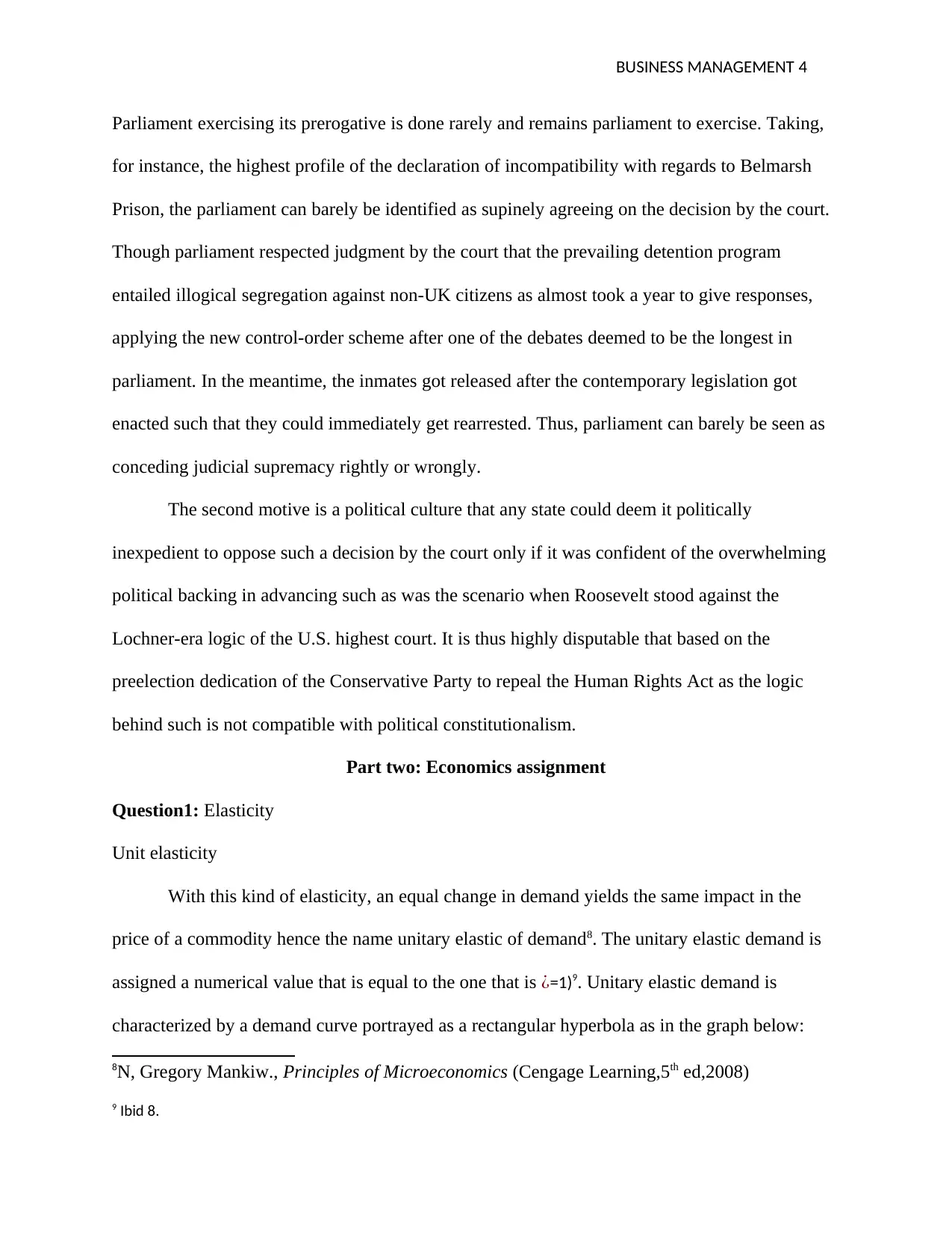
BUSINESS MANAGEMENT 4
Parliament exercising its prerogative is done rarely and remains parliament to exercise. Taking,
for instance, the highest profile of the declaration of incompatibility with regards to Belmarsh
Prison, the parliament can barely be identified as supinely agreeing on the decision by the court.
Though parliament respected judgment by the court that the prevailing detention program
entailed illogical segregation against non-UK citizens as almost took a year to give responses,
applying the new control-order scheme after one of the debates deemed to be the longest in
parliament. In the meantime, the inmates got released after the contemporary legislation got
enacted such that they could immediately get rearrested. Thus, parliament can barely be seen as
conceding judicial supremacy rightly or wrongly.
The second motive is a political culture that any state could deem it politically
inexpedient to oppose such a decision by the court only if it was confident of the overwhelming
political backing in advancing such as was the scenario when Roosevelt stood against the
Lochner-era logic of the U.S. highest court. It is thus highly disputable that based on the
preelection dedication of the Conservative Party to repeal the Human Rights Act as the logic
behind such is not compatible with political constitutionalism.
Part two: Economics assignment
Question1: Elasticity
Unit elasticity
With this kind of elasticity, an equal change in demand yields the same impact in the
price of a commodity hence the name unitary elastic of demand8. The unitary elastic demand is
assigned a numerical value that is equal to the one that is ¿=1)9. Unitary elastic demand is
characterized by a demand curve portrayed as a rectangular hyperbola as in the graph below:
8N, Gregory Mankiw., Principles of Microeconomics (Cengage Learning,5th ed,2008)
9 Ibid 8.
Parliament exercising its prerogative is done rarely and remains parliament to exercise. Taking,
for instance, the highest profile of the declaration of incompatibility with regards to Belmarsh
Prison, the parliament can barely be identified as supinely agreeing on the decision by the court.
Though parliament respected judgment by the court that the prevailing detention program
entailed illogical segregation against non-UK citizens as almost took a year to give responses,
applying the new control-order scheme after one of the debates deemed to be the longest in
parliament. In the meantime, the inmates got released after the contemporary legislation got
enacted such that they could immediately get rearrested. Thus, parliament can barely be seen as
conceding judicial supremacy rightly or wrongly.
The second motive is a political culture that any state could deem it politically
inexpedient to oppose such a decision by the court only if it was confident of the overwhelming
political backing in advancing such as was the scenario when Roosevelt stood against the
Lochner-era logic of the U.S. highest court. It is thus highly disputable that based on the
preelection dedication of the Conservative Party to repeal the Human Rights Act as the logic
behind such is not compatible with political constitutionalism.
Part two: Economics assignment
Question1: Elasticity
Unit elasticity
With this kind of elasticity, an equal change in demand yields the same impact in the
price of a commodity hence the name unitary elastic of demand8. The unitary elastic demand is
assigned a numerical value that is equal to the one that is ¿=1)9. Unitary elastic demand is
characterized by a demand curve portrayed as a rectangular hyperbola as in the graph below:
8N, Gregory Mankiw., Principles of Microeconomics (Cengage Learning,5th ed,2008)
9 Ibid 8.
Paraphrase This Document
Need a fresh take? Get an instant paraphrase of this document with our AI Paraphraser
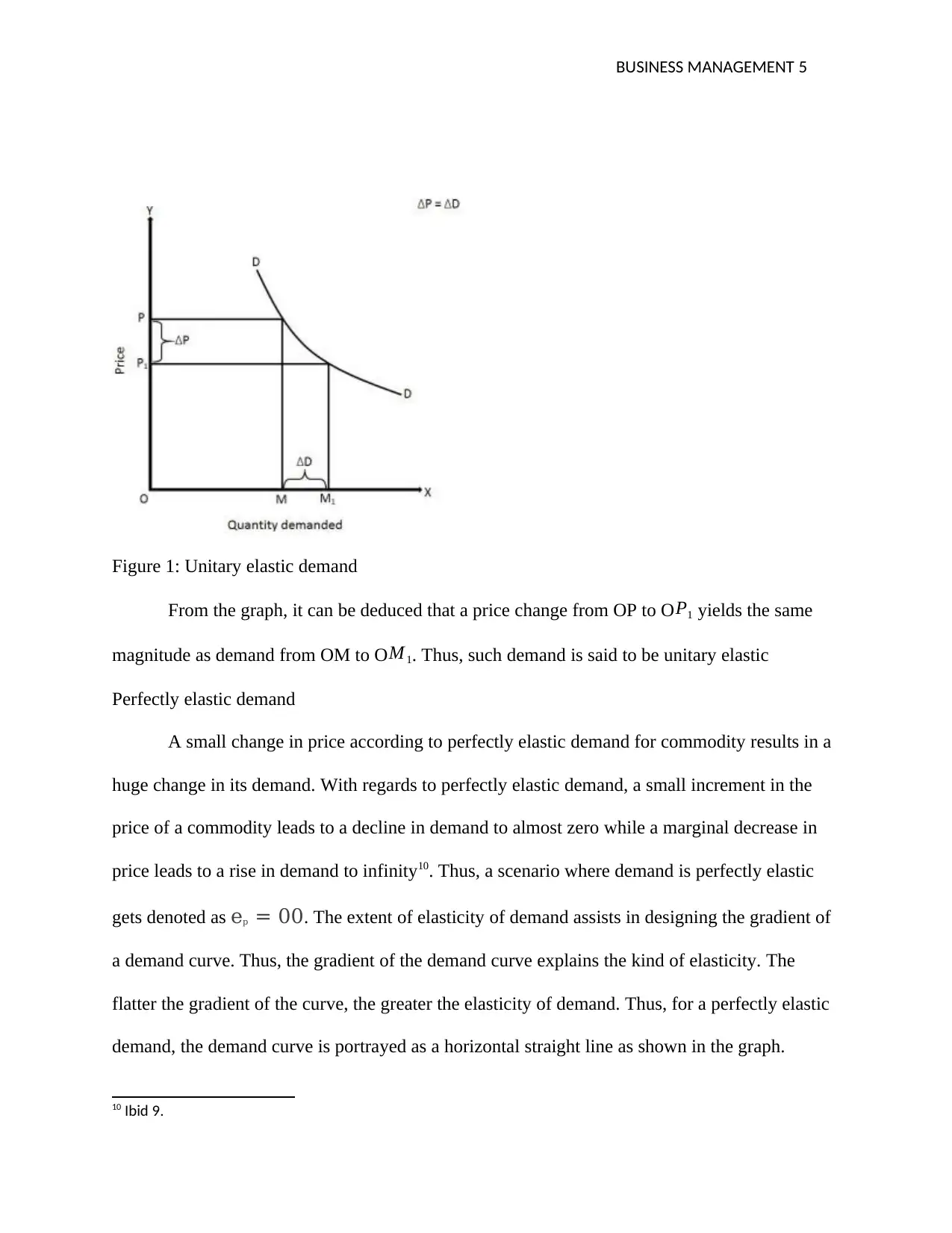
BUSINESS MANAGEMENT 5
Figure 1: Unitary elastic demand
From the graph, it can be deduced that a price change from OP to O P1 yields the same
magnitude as demand from OM to OM 1. Thus, such demand is said to be unitary elastic
Perfectly elastic demand
A small change in price according to perfectly elastic demand for commodity results in a
huge change in its demand. With regards to perfectly elastic demand, a small increment in the
price of a commodity leads to a decline in demand to almost zero while a marginal decrease in
price leads to a rise in demand to infinity10. Thus, a scenario where demand is perfectly elastic
gets denoted as ep = 00. The extent of elasticity of demand assists in designing the gradient of
a demand curve. Thus, the gradient of the demand curve explains the kind of elasticity. The
flatter the gradient of the curve, the greater the elasticity of demand. Thus, for a perfectly elastic
demand, the demand curve is portrayed as a horizontal straight line as shown in the graph.
10 Ibid 9.
Figure 1: Unitary elastic demand
From the graph, it can be deduced that a price change from OP to O P1 yields the same
magnitude as demand from OM to OM 1. Thus, such demand is said to be unitary elastic
Perfectly elastic demand
A small change in price according to perfectly elastic demand for commodity results in a
huge change in its demand. With regards to perfectly elastic demand, a small increment in the
price of a commodity leads to a decline in demand to almost zero while a marginal decrease in
price leads to a rise in demand to infinity10. Thus, a scenario where demand is perfectly elastic
gets denoted as ep = 00. The extent of elasticity of demand assists in designing the gradient of
a demand curve. Thus, the gradient of the demand curve explains the kind of elasticity. The
flatter the gradient of the curve, the greater the elasticity of demand. Thus, for a perfectly elastic
demand, the demand curve is portrayed as a horizontal straight line as shown in the graph.
10 Ibid 9.
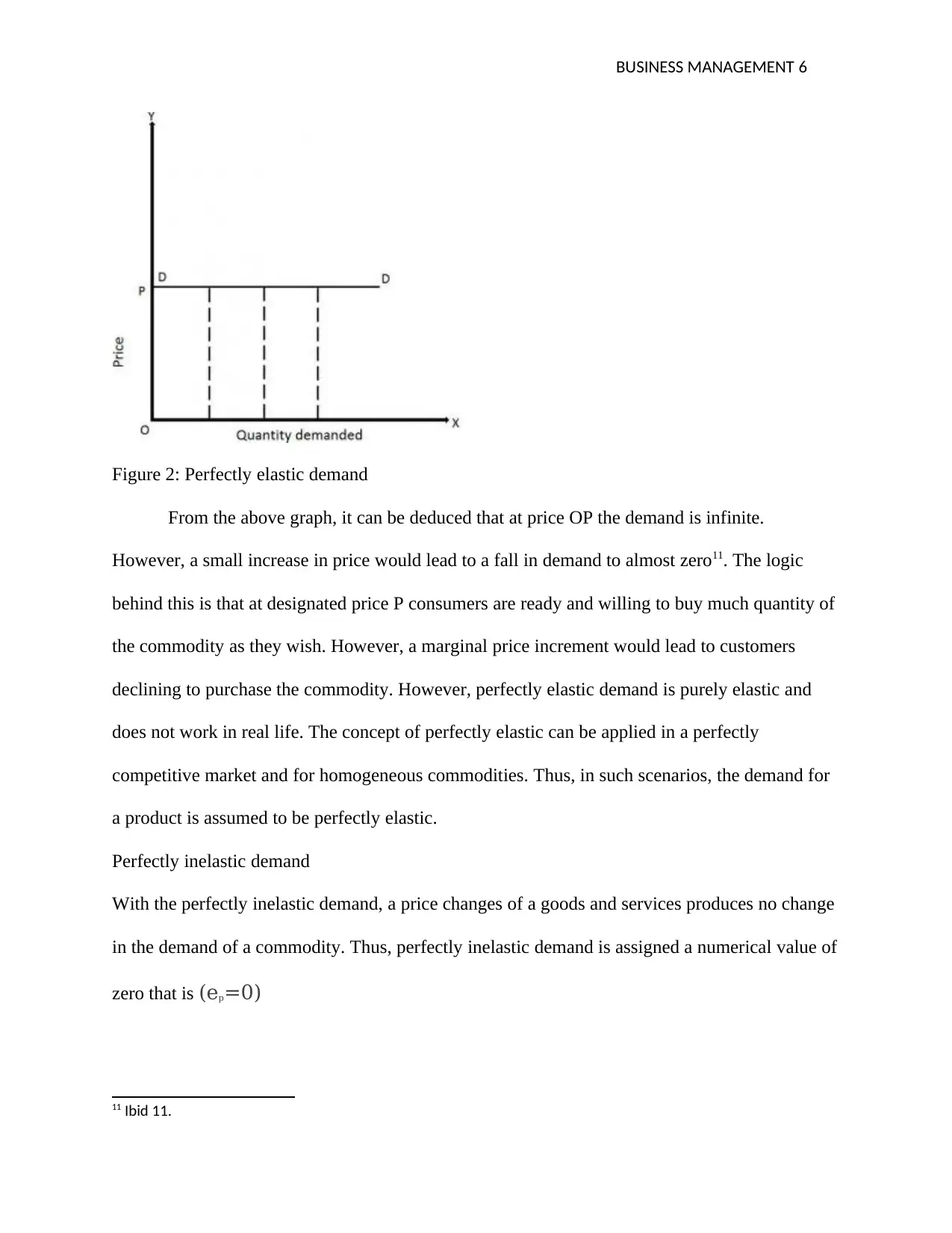
BUSINESS MANAGEMENT 6
Figure 2: Perfectly elastic demand
From the above graph, it can be deduced that at price OP the demand is infinite.
However, a small increase in price would lead to a fall in demand to almost zero11. The logic
behind this is that at designated price P consumers are ready and willing to buy much quantity of
the commodity as they wish. However, a marginal price increment would lead to customers
declining to purchase the commodity. However, perfectly elastic demand is purely elastic and
does not work in real life. The concept of perfectly elastic can be applied in a perfectly
competitive market and for homogeneous commodities. Thus, in such scenarios, the demand for
a product is assumed to be perfectly elastic.
Perfectly inelastic demand
With the perfectly inelastic demand, a price changes of a goods and services produces no change
in the demand of a commodity. Thus, perfectly inelastic demand is assigned a numerical value of
zero that is (ep=0)
11 Ibid 11.
Figure 2: Perfectly elastic demand
From the above graph, it can be deduced that at price OP the demand is infinite.
However, a small increase in price would lead to a fall in demand to almost zero11. The logic
behind this is that at designated price P consumers are ready and willing to buy much quantity of
the commodity as they wish. However, a marginal price increment would lead to customers
declining to purchase the commodity. However, perfectly elastic demand is purely elastic and
does not work in real life. The concept of perfectly elastic can be applied in a perfectly
competitive market and for homogeneous commodities. Thus, in such scenarios, the demand for
a product is assumed to be perfectly elastic.
Perfectly inelastic demand
With the perfectly inelastic demand, a price changes of a goods and services produces no change
in the demand of a commodity. Thus, perfectly inelastic demand is assigned a numerical value of
zero that is (ep=0)
11 Ibid 11.
⊘ This is a preview!⊘
Do you want full access?
Subscribe today to unlock all pages.

Trusted by 1+ million students worldwide
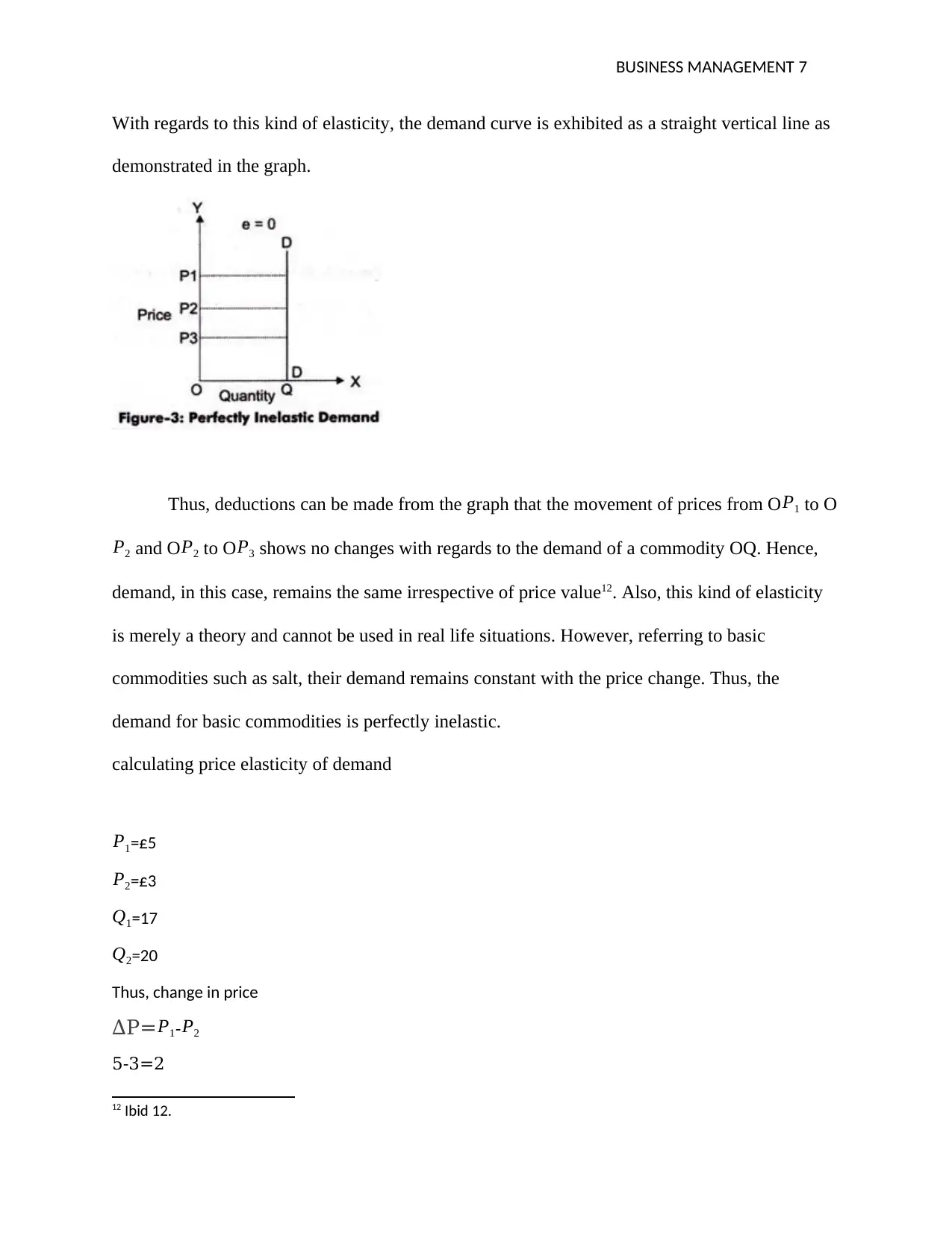
BUSINESS MANAGEMENT 7
With regards to this kind of elasticity, the demand curve is exhibited as a straight vertical line as
demonstrated in the graph.
Thus, deductions can be made from the graph that the movement of prices from O P1 to O
P2 and OP2 to OP3 shows no changes with regards to the demand of a commodity OQ. Hence,
demand, in this case, remains the same irrespective of price value12. Also, this kind of elasticity
is merely a theory and cannot be used in real life situations. However, referring to basic
commodities such as salt, their demand remains constant with the price change. Thus, the
demand for basic commodities is perfectly inelastic.
calculating price elasticity of demand
P1=£5
P2=£3
Q1=17
Q2=20
Thus, change in price
∆P= P1- P2
5-3=2
12 Ibid 12.
With regards to this kind of elasticity, the demand curve is exhibited as a straight vertical line as
demonstrated in the graph.
Thus, deductions can be made from the graph that the movement of prices from O P1 to O
P2 and OP2 to OP3 shows no changes with regards to the demand of a commodity OQ. Hence,
demand, in this case, remains the same irrespective of price value12. Also, this kind of elasticity
is merely a theory and cannot be used in real life situations. However, referring to basic
commodities such as salt, their demand remains constant with the price change. Thus, the
demand for basic commodities is perfectly inelastic.
calculating price elasticity of demand
P1=£5
P2=£3
Q1=17
Q2=20
Thus, change in price
∆P= P1- P2
5-3=2
12 Ibid 12.
Paraphrase This Document
Need a fresh take? Get an instant paraphrase of this document with our AI Paraphraser
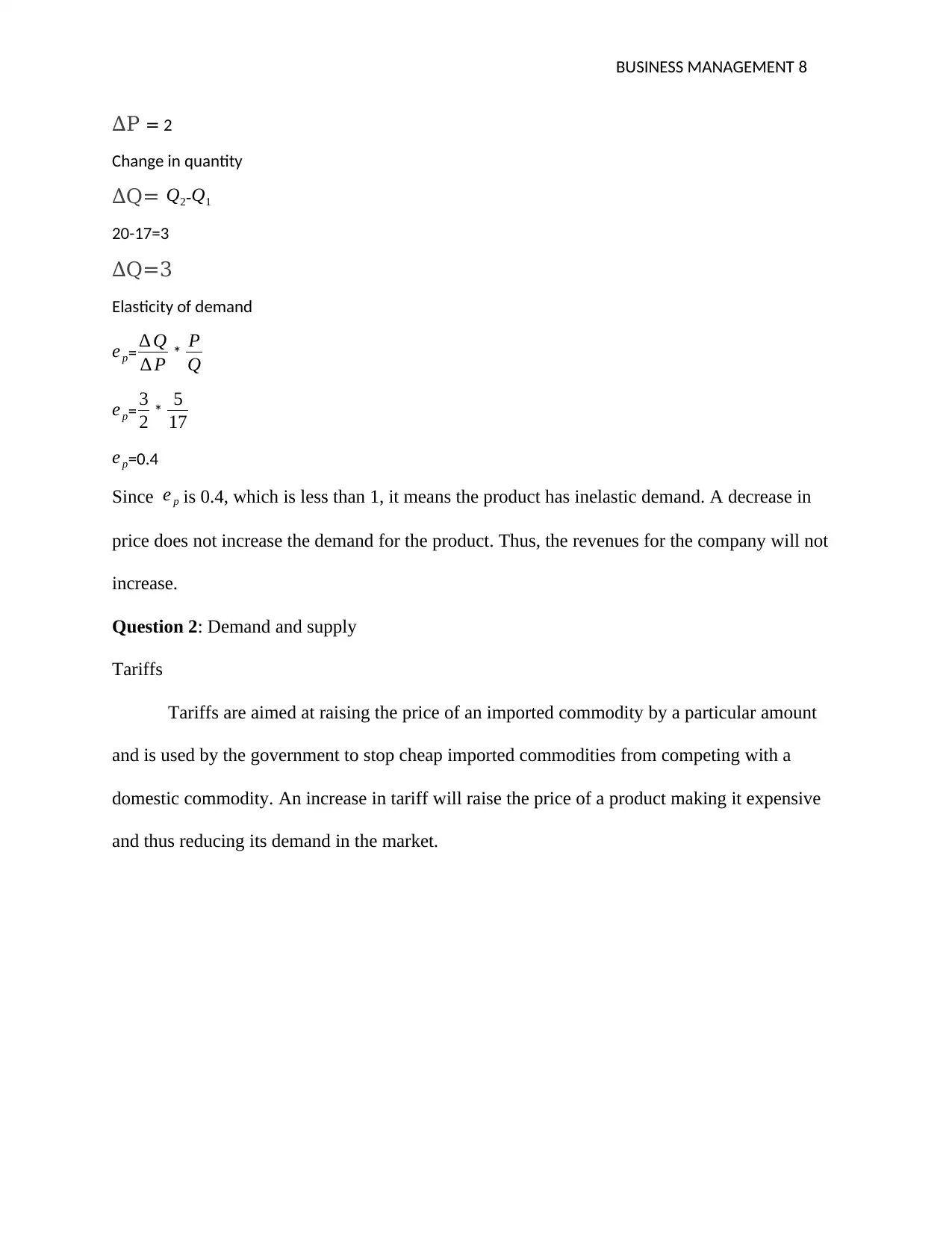
BUSINESS MANAGEMENT 8
∆P = 2
Change in quantity
∆Q= Q2-Q1
20-17=3
∆Q=3
Elasticity of demand
e p= ∆ Q
∆ P * P
Q
e p= 3
2 * 5
17
e p=0.4
Since e p is 0.4, which is less than 1, it means the product has inelastic demand. A decrease in
price does not increase the demand for the product. Thus, the revenues for the company will not
increase.
Question 2: Demand and supply
Tariffs
Tariffs are aimed at raising the price of an imported commodity by a particular amount
and is used by the government to stop cheap imported commodities from competing with a
domestic commodity. An increase in tariff will raise the price of a product making it expensive
and thus reducing its demand in the market.
∆P = 2
Change in quantity
∆Q= Q2-Q1
20-17=3
∆Q=3
Elasticity of demand
e p= ∆ Q
∆ P * P
Q
e p= 3
2 * 5
17
e p=0.4
Since e p is 0.4, which is less than 1, it means the product has inelastic demand. A decrease in
price does not increase the demand for the product. Thus, the revenues for the company will not
increase.
Question 2: Demand and supply
Tariffs
Tariffs are aimed at raising the price of an imported commodity by a particular amount
and is used by the government to stop cheap imported commodities from competing with a
domestic commodity. An increase in tariff will raise the price of a product making it expensive
and thus reducing its demand in the market.

BUSINESS MANAGEMENT 9
In the graph above an increase in tariff raises the price of the imported commodity which
in turn reduces the demand of the product. The same will occur when there is an increase in tariff
for iPhone 8. Thus, raising tariff on iPhones will raise their price making them exorbitant
compared to other phones and this will reduce their demand.
Samsung reduces its price by 10%
Samsung and iPhones from Apple are close substitutes as they are both manufacturers of
mobile phones. Substitute commodities are those commodities that are used in place of one
another for purposes of satisfying the specific wants. It is crucial to note that the demand for a
particular product varies directly with the price of a substitute commodity. For instance, the price
of Samsung phones reducing by 10% means that the demand for iPhones will reduce while the
demand for Samsung phones will increase as it is relatively cheaper to purchase Samsung phones
compared to substitute phones such as those by Apple.
In the graph above an increase in tariff raises the price of the imported commodity which
in turn reduces the demand of the product. The same will occur when there is an increase in tariff
for iPhone 8. Thus, raising tariff on iPhones will raise their price making them exorbitant
compared to other phones and this will reduce their demand.
Samsung reduces its price by 10%
Samsung and iPhones from Apple are close substitutes as they are both manufacturers of
mobile phones. Substitute commodities are those commodities that are used in place of one
another for purposes of satisfying the specific wants. It is crucial to note that the demand for a
particular product varies directly with the price of a substitute commodity. For instance, the price
of Samsung phones reducing by 10% means that the demand for iPhones will reduce while the
demand for Samsung phones will increase as it is relatively cheaper to purchase Samsung phones
compared to substitute phones such as those by Apple.
⊘ This is a preview!⊘
Do you want full access?
Subscribe today to unlock all pages.

Trusted by 1+ million students worldwide
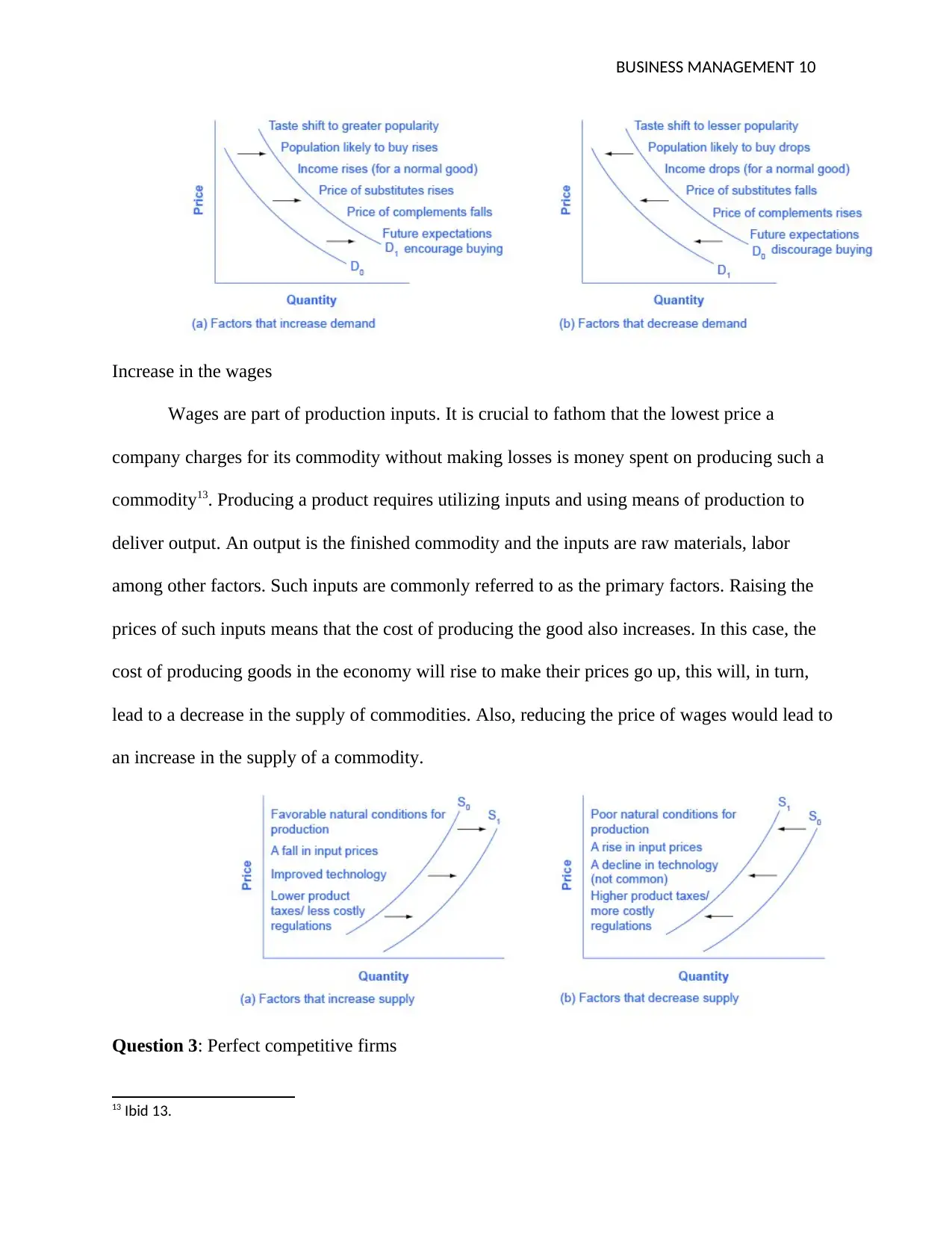
BUSINESS MANAGEMENT 10
Increase in the wages
Wages are part of production inputs. It is crucial to fathom that the lowest price a
company charges for its commodity without making losses is money spent on producing such a
commodity13. Producing a product requires utilizing inputs and using means of production to
deliver output. An output is the finished commodity and the inputs are raw materials, labor
among other factors. Such inputs are commonly referred to as the primary factors. Raising the
prices of such inputs means that the cost of producing the good also increases. In this case, the
cost of producing goods in the economy will rise to make their prices go up, this will, in turn,
lead to a decrease in the supply of commodities. Also, reducing the price of wages would lead to
an increase in the supply of a commodity.
Question 3: Perfect competitive firms
13 Ibid 13.
Increase in the wages
Wages are part of production inputs. It is crucial to fathom that the lowest price a
company charges for its commodity without making losses is money spent on producing such a
commodity13. Producing a product requires utilizing inputs and using means of production to
deliver output. An output is the finished commodity and the inputs are raw materials, labor
among other factors. Such inputs are commonly referred to as the primary factors. Raising the
prices of such inputs means that the cost of producing the good also increases. In this case, the
cost of producing goods in the economy will rise to make their prices go up, this will, in turn,
lead to a decrease in the supply of commodities. Also, reducing the price of wages would lead to
an increase in the supply of a commodity.
Question 3: Perfect competitive firms
13 Ibid 13.
Paraphrase This Document
Need a fresh take? Get an instant paraphrase of this document with our AI Paraphraser

BUSINESS MANAGEMENT 11
Perfectly competitive firm in the short-run
The short-run is characterized by the both the demand and supply curves intersecting to
determine the market clearing price14. The market-clearing price gets assumed by all firms in the
industry. The average revenue curve in this context refers to the individual demand curves. The
market price remains the same for every unit sold and this translates to the average revenue curve
becoming the marginal revenue curve for a company in perfect competition. For the firm, the
profit-maximizing quantity is at Q1 where marginal cost equals the marginal revenue. Such an
output yields gross revenue(P1*Q1). Now that revenue exceeds the total cost, the firm in this
illustration makes abnormal profits. Thus, it is imperative to note that the supernormal profit will
be made when the the average cost is less than the price.
14 Ibid 14.
Perfectly competitive firm in the short-run
The short-run is characterized by the both the demand and supply curves intersecting to
determine the market clearing price14. The market-clearing price gets assumed by all firms in the
industry. The average revenue curve in this context refers to the individual demand curves. The
market price remains the same for every unit sold and this translates to the average revenue curve
becoming the marginal revenue curve for a company in perfect competition. For the firm, the
profit-maximizing quantity is at Q1 where marginal cost equals the marginal revenue. Such an
output yields gross revenue(P1*Q1). Now that revenue exceeds the total cost, the firm in this
illustration makes abnormal profits. Thus, it is imperative to note that the supernormal profit will
be made when the the average cost is less than the price.
14 Ibid 14.
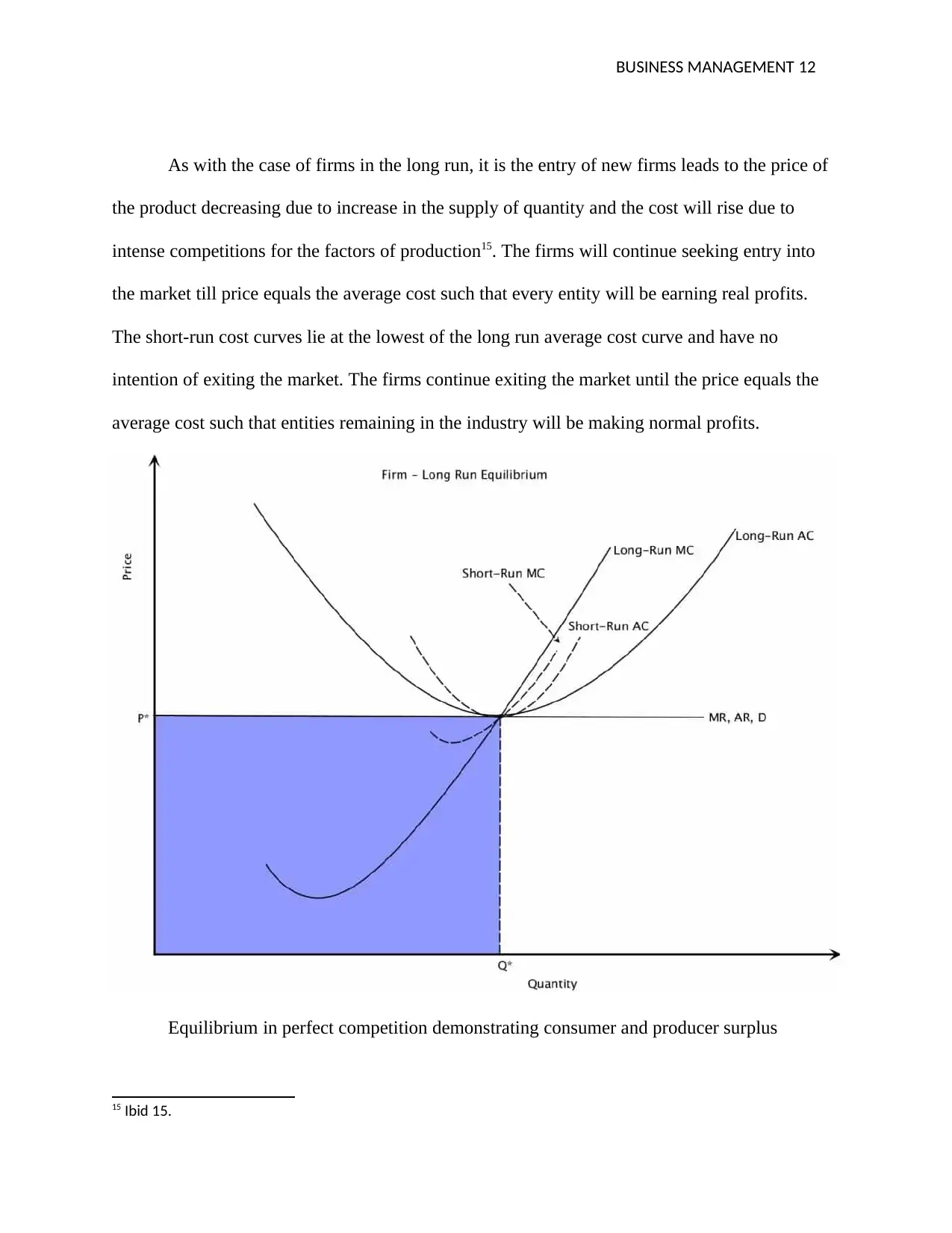
BUSINESS MANAGEMENT 12
As with the case of firms in the long run, it is the entry of new firms leads to the price of
the product decreasing due to increase in the supply of quantity and the cost will rise due to
intense competitions for the factors of production15. The firms will continue seeking entry into
the market till price equals the average cost such that every entity will be earning real profits.
The short-run cost curves lie at the lowest of the long run average cost curve and have no
intention of exiting the market. The firms continue exiting the market until the price equals the
average cost such that entities remaining in the industry will be making normal profits.
Equilibrium in perfect competition demonstrating consumer and producer surplus
15 Ibid 15.
As with the case of firms in the long run, it is the entry of new firms leads to the price of
the product decreasing due to increase in the supply of quantity and the cost will rise due to
intense competitions for the factors of production15. The firms will continue seeking entry into
the market till price equals the average cost such that every entity will be earning real profits.
The short-run cost curves lie at the lowest of the long run average cost curve and have no
intention of exiting the market. The firms continue exiting the market until the price equals the
average cost such that entities remaining in the industry will be making normal profits.
Equilibrium in perfect competition demonstrating consumer and producer surplus
15 Ibid 15.
⊘ This is a preview!⊘
Do you want full access?
Subscribe today to unlock all pages.

Trusted by 1+ million students worldwide
1 out of 17
Related Documents
Your All-in-One AI-Powered Toolkit for Academic Success.
+13062052269
info@desklib.com
Available 24*7 on WhatsApp / Email
![[object Object]](/_next/static/media/star-bottom.7253800d.svg)
Unlock your academic potential
Copyright © 2020–2026 A2Z Services. All Rights Reserved. Developed and managed by ZUCOL.




